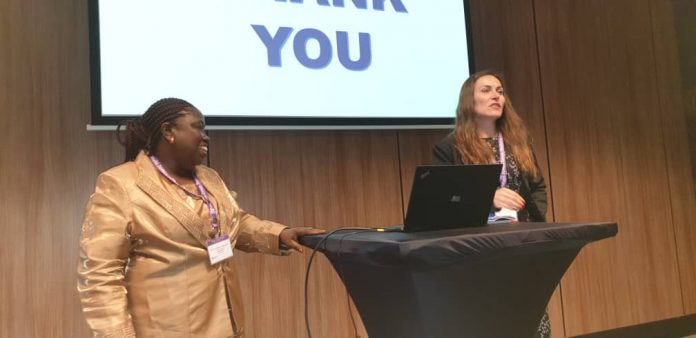The work of the Legal Aid Board in implementing Goal 16 of the Sustainable Development Goals (SDGs) on access to justice has been showcased at a side event at the just concluded World Justice Forum in The Hague, Netherlands. Sierra Leone, South African and Brazil were the only countries to be showcased at the side event.
The Executive Director of the Legal Aid Board, Ms. Fatmata Claire Carlton-Hanciles presented a paper on the topic, ‘Agenda 2030 – Approaches to nationalizing and Implementing Goal 16 and Access to Justice’ at the Forum on Tuesday 30th April 2019.’
She told the Forum that the provision of primary justice services by Paralegals across the country has significantly improved access especially in remote communities, which have very limited access to the Criminal Justice System.
‘We do this through mediation of minor disputes which are of a civil nature; Legal Empowerment through community and school outreach to educate people about the laws, human rights and the legal processes; referral of matters from the Informal to the Formal Courts; monitoring of Local and Informal Courts in terms of the matters they hear and determine and provision of advice and legal assistance to traditional leaders and their subjects,’ she said.
In addition, she noted that the Board has established satellite offices, Community Advisory Bureaus (CAB) in twenty Wards in the capital Freetown, which are aimed at making justice accessible and affordable by empowering local communities to take ownership of their justice needs through the provision of primary justice services to members of the community.
Ms. Carlton-Hanciles intimated the Forum that the Board developed a National Training Manual for Paralegals in 2017. She added that plans are already in place for the introduction of the formal training of Paralegals at the Judicial and Legal Training Institute (JLTI). This will also be introduced in Tertiary and Higher Institutions in the Country in future.
She noted that the Board continues to train partners and traditional leaders on access to justice issues. ‘The Board trained 44 traditional chiefs of the Western Area Council of Tribal Headmen as Paralegals to educate them on their powers in terms of matters they can hear and determine, referrals for matters which fall outside their remit, mediation skills and assistance they can offer to their tribe’s men and women accessing the formal and informal justice system,’ she explained.
She added that the trainings were meant to empower tribal heads, who operate informal courts as to their powers under the law in terms of matters they can hear and determine, referrals for matters which fall outside their remit, mediation and assistance they could provide their tribe’s men and women accessing the formal and informal justice system. ‘These partnerships are important to the work of the Board in terms of collaboration in community outreach events, information sharing, establishment of access to justice structures, community mobilization and resource sharing,’ she said.
On the innovative use of technology to improve access to justice, Ms. Carlton-Hanciles said that WhatsApp groups are used to educate, report on activities on a regular basis, provide support to each other, discuss successes and challenges in a timely and speedy manner. ‘The Forums are crucial to the work of the Board, especially for Paralegals in remote parts of the country with little or no access to the internet in terms of providing instant updates on issues of justice,’ she said
The presentation was climaxed with the presentation of statistical data and criminal justice indicators for Sierra Leone. The cumulative date indicate that 250,499 people including non-Sierra Leoneans, benefited from the scheme from its inception in May 2015 to March 2019, by way of legal advice and Legal representation, Alternative Dispute Resolution (ADR) and Legal Empowerment/ Legal Education.
106,655 people benefitted from the scheme in 2018. This is up 23,602 in 2017 when 83,053 people benefitted from the scheme. 30,009 females and 39,834 children benefitted from the scheme in 2018. These account for 14% and 19% of beneficiaries respectively. While males accounted for majority (78%) of beneficiaries of legal representation provided by Legal Aid Counsels, females and children accounted for majority (80%) of beneficiaries of the Alternative Dispute Resolution/Mediation.
She said that the Board has been able to secure the release of 117 inmates by habeas corpus; some of whom had been on remand without trial for seven or more years.
Subscribe
Login
0 Comments
Oldest




